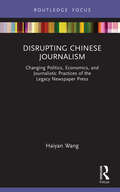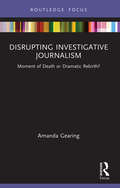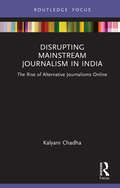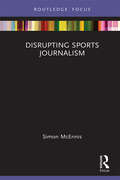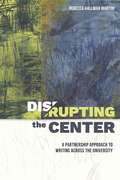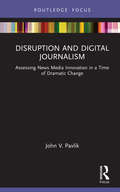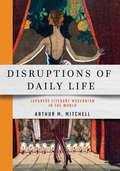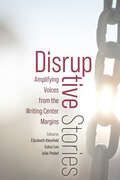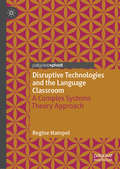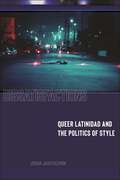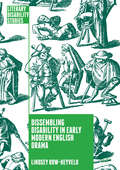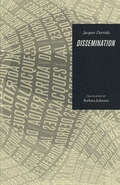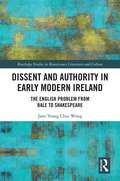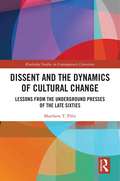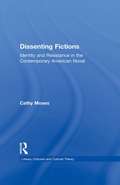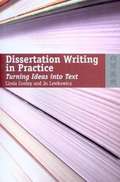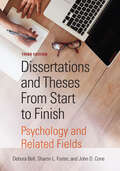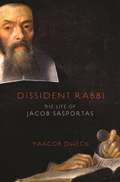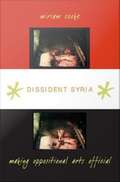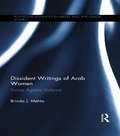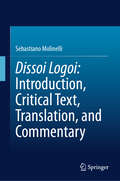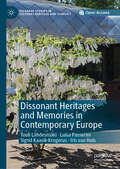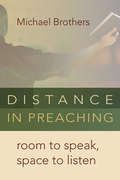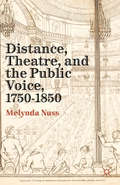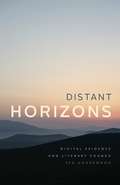- Table View
- List View
Disrupting Chinese Journalism: Changing Politics, Economics, and Journalistic Practices of the Legacy Newspaper Press (Disruptions)
by Haiyan WangDisrupting Chinese Journalism provides a rich insight into the disruptive effects of digital technologies – especially smart-phones – on the Chinese print media market. Pulling from an extensive corpus of original research, including 191 face-to-face interviews with managers and journalists, and a content analysis of some 4,000 news reports, Haiyan Wang examines how Chinese legacy newspapers have responded to the changing digital media environment, including by adapting their organizational structures, revenue models, and journalistic practices. This book also points to how the government has taken a more interventionist stance on editorial content, and how this has further complicated the digital transitions of the Chinese media. This book is an invaluable resource for students of media studies, journalism, Chinese area studies, and digital technology.
Disrupting Investigative Journalism: Moment of Death or Dramatic Rebirth? (Disruptions)
by Amanda GearingThis book makes the case for the enormous potential embodied in investigative journalism if reporters collaborate in the digital sphere and engage with emerging techniques and technologies. Bringing together personal narratives from investigative journalists who have successfully found, verified and published stories using social media platforms and Web based communications, Disrupting Investigative Journalism explores the risks and benefits that come from this kind of digital collaboration. Citing how digital connection has enabled reporters around the world to form the International Consortium of Investigative Journalists, which in turn led to such global news sensations as the Panama Papers and the Paradise Papers, this book makes a practical argument for how the daily work of investigative journalism can change to capture enormous latent potential. This is a valuable text for students and scholars in the fields of investigative journalism, media and digital communication.
Disrupting Mainstream Journalism in India: The Rise of Alternative Journalisms Online (ISSN)
by Kalyani ChadhaDisrupting Mainstream Journalism in India offers a comprehensive and empirically-grounded analysis of the production of digital journalism by marginalized groups within Indian society.Drawing on in-depth interviews with practitioners as well as samples of news content, the author critically examines the way in which varied forms of digital alternative journalism provide socially, economically and politically disadvantaged groups with new and unprecedented opportunities to express their own perspectives, as well as offering alternatives to the hegemony of mainstream news narratives. These marginalized groups include women, Dalits and Muslims whose voices tend to be erased or misrepresented within the public sphere. By exploring these disruptions, Chadha offers insight into not only into the new media landscape of India but also its implications for journalism and democracy at large.Disrupting Mainstream Journalism in India is a valuable empirical resource for students and scholars interested in Indian media, journalism and democracy.
Disrupting Sports Journalism (Disruptions)
by Simon McEnnisThis book critically explores the impact that digital technology has had on the practices and norms of sports journalism. In the wake of major digital disruptions in news reporting, the author analyses how sports journalism has been particularly vulnerable to challenges and attacks on its expertise because of its historically weak commitment to professionalism. Ultimately, an argument is built that sports journalism’s professional distinctiveness will depend on its capacity to produce rigorous news work at a time when its core, routinised practices are being displaced by bloggers and team media. Recent developments such as The Athletic, a start-up that has built its business model around quality sports storytelling, and the impact of the COVID-19 pandemic offer hope that a paradigm shift in digital sports journalism culture towards serious reporting is starting to emerge. The question for both the industry and scholars going forward is whether these changes will crystallise and take hold in the long term. Disrupting Sports Journalism is a valuable text for researchers and students in sports media and journalism studies, as well as for industry professionals seeking an insight into developments in the field.
Disrupting the Center: A Partnership Approach to Writing Across the University
by Rebecca Hallman MartiniStrategic partnership offers writing centers a framework for responding to disruptive innovations in higher education. Through partnership, writing centers can simultaneously secure resources and support the practice of tutoring writing in ways that enable moments of resistance, where writing consultants and students can tactically challenge the corporate university through their methods of practice. Disrupting the Center explicates, analyzes, and critiques one particular writing center’s partnership approach to collaboration with disciplinary faculty and upper administrators across the curriculum. Using on-site research and critical ethnographic study from one university writing center, Rebecca Hallman Martini establishes an innovative, cross-disciplinary partnership approach to writing instruction in which peer tutoring plays an integral curricular role. Case studies detail three partnerships that respond directly to existing or potential disruptive innovations in higher education and showcase important concepts: mapping mutual benefit and stakeholder engagement in an online studio/hybrid first-year writing program partnership in response to online education, creating negotiated space to work through ethical issues involved when working with a public-private partnership to develop a required extracurricular portfolio project in a business school, and building transformational partnerships through establishing a writing-in-the-professions curriculum in the College of Engineering in response to career readiness initiatives. Disrupting the Center uses interviews, observations, focus groups, analysis of consultations, meetings, and shared documents such as annual reports, budgets, assessment data, assignments, and syllabi to generate a wide view of how systems work. Writing centers are flexible university-wide service spaces where students go for one-on-one and group writing support that can become dynamic spaces for writing pedagogy by disrupting, revitalizing, and reinventing the epistemic foundations of current rhetoric and composition landscapes and traditional approaches to writing.
Disruption and Digital Journalism: Assessing News Media Innovation in a Time of Dramatic Change (Disruptions)
by John V. PavlikThis book offers a timely insight into how the news media have adapted to the digital transformation of public communication infrastructure. Providing a conceptual roadmap to understanding the disruptive, innovative impact of digital networked journalism in the 21st century, the author critically examines how and to what extent news media around the world have engaged in digital adaptation. Making use of data from news media content production and distribution both off- and online, as well as user and financial data from the U.S. and internationally, the book traces how the news media embraced and reacted to key developments such as the invention of the World Wide Web in 1989 and the launch of Google in 1998, Facebook in 2004, and the Apple iPhone in 2009. The author also highlights innovative organizations that have sought to reimagine news media that are optimized for digital, online, and mobile media of the 21st century, demonstrating how these groups have been able to stay better engaged with the public. Disruption and Digital Journalism is recommended reading for all academics and scholars with an interest in media, digital journalism studies, and technological innovation.
Disruptions of Daily Life: Japanese Literary Modernism in the World (Studies of the Weatherhead East Asian Institute, Columbia University)
by Arthur M. MitchellDisruptions of Daily Life explores the mass media landscape of early twentieth century in order to uncover the subversive societal impact of four major Japanese authors: Tanizaki Jun'ichirō, Yokomitsu Riichi, Kawabata Yasunari, and Hirabayashi Taiko. Arthur Mitchell examines this literature against global realities through a modernist lens, studying an alternative modernism that challenges the Western European model.Through broad surveys of discussions surrounding Japanese life in the 1920s, Mitchell locates and examines flourishing divergent ideologies of the early twentieth century such as gender, ethnicity, and nationalism. He unravels how the narrative and linguistic strategies of modernist texts interrogated the innocence of this language, disrupting their hold on people's imagined relationship to daily life. These modernist works often discursively displaced the authority of their own claims by inadvertently exposing the global epistemology of East vs. West. Mitchell's reading of these formalist texts expands modernism studies into a more translational dialogue by locating subversions within the local historical culture and allowing readers to make connections to the time and place in which the texts were written. In highlighting the unbreakable link between literature and society, Disruptions of Daily Life reaffirms the value of modernist fiction and its ability to make us aware of how realities are constructed—and how those realities can be changed.
Disruptive Stories: Amplifying Voices from the Writing Center Margins
by Elizabeth Kleinfeld Sohui Lee Julie PrebelDisruptive Stories uses an activist editing method to select and publish authors that have been marginalized in scholarly conversations and enrich the understanding of lived writing center experiences that have been underrepresented in writing center scholarship. These chapters explore how marginality affects writing centers, the people who work in them, and the scholarship generated from them by examining the consequences—both positive and negative—of marginalization through a mix of narratives and research. Contributors provide unique perspectives ranging across status, role, nationality, race, and ability. While US tenure-track writing center administrators (WCAs) do not make up the majority of those who hold WCA positions in writing centers, they are more likely to be the storytellers of the writing center grand narrative. They publish more, present more conference papers, edit more journals, and participate more in organizational leadership. This collection complicates that narrative by adding marginalized voices and experiences in three thematic categories: structural marginalization, globalization and marginalization, and embodied marginalization. Disruptive Stories spurs further conversations about ways to improve the review process in writing center scholarship so that it more accurately reflects the growing diversity of its administrators and practitioners.
Disruptive Technologies and the Language Classroom: A Complex Systems Theory Approach
by Regine HampelAlthough new technologies are embedded in students’ lives today, there is often an assumption that their use is transparent, inconsequential, or a distraction. This book combines complex systems theory with sociocultural theory and the multimodal theory of communication, providing an innovative theoretical framework to examine how communication and meaning-making in the language classroom have developed over time, how technology impacts on meaning-making, and what the implications are for learners, teachers, institutions and policy makers. Recent studies provide evidence for the disruptive effect of technology which has resulted in a phase shift that is reshaping language education by creating new interaction patterns, allowing for multimodal communication, and introducing real-world communication into the classroom. The book proposes ways of responding to this shift before concluding that the new technologies are radically transforming the way we learn. It is likely to appeal to a range of readers, including students, academics, teachers and policy-makers.
Dissatisfactions: Queer Latinidad and the Politics of Style (Minoritarian Aesthetics)
by Joshua Javier GuzmánHow the queer Chicano punks of post-1960s Los Angeles developed a unique politics of styleIn this groundbreaking work, Joshua Javier Guzmán explores the queer punk and Chicano/Latino avant-garde art scenes in post-1968 Los Angeles from the rise of Ronald Reagan to the height of the AIDS epidemic. He demonstrates how style–as a cultural form and sensibility–becomes essential to Latino politics at the moment the utopian impulses of the 1960s begin to fade.Guzmán uncovers how queer Latinos in Los Angeles used performance, underground media, experimental art, and literature to interrogate the limits of Chicano nationalism and the burgeoning politics of gay liberation. These subcultural forms give rise to a theory of what he calls “stylized discontent,” expressed as nausea, lo-fi, ambivalence, and malaise. Each chapter of the book is framed by a specific stylized discontent, demonstrating how they were repurposed by queer punk Latinos as responses to the AIDS crisis and the rise of neoliberalisms.Dissatisfactions highlights the middle ranges of political agency strategically utilized by queer racialized historical actors to underscore how negative feelings become instrumental to social change. Revealing new forms of activism and art that continue to structure the way we understand systemic violence and survival, Dissatisfactions insists on the significance of both the politics of style and the different styles politics may take.
Dissembling Disability in Early Modern English Drama (Literary Disability Studies)
by Lindsey Row-HeyveldWhy do able-bodied characters fake disability in 40 early modern English plays? This book uncovers a previously unexamined theatrical tradition and explores the way counterfeit disability captivated the Renaissance stage. Through detailed case studies of both lesser-known and canonical plays (by Shakespeare, Jonson, Marston, and others), Lindsey Row-Heyveld demonstrates why counterfeit disability proved so useful to early modern playwrights. Changing approaches to almsgiving in the English Reformation led to increasing concerns about feigned disability. The theater capitalized on those concerns, using the counterfeit-disability tradition to explore issues of charity, epistemology, and spectatorship. By illuminating this neglected tradition, this book fills an important gap in both disability history and literary studies, and explores how fears of counterfeit disability created a feedback loop of performance and suspicion. The result is the still-pervasive insistence that even genuinely disabled people must perform in order to, paradoxically, prove the authenticity of their impairments.
Dissemination
by Jacques DerridaInterpretations of Plato, Stéphane Mallarmé, and Philippe Sollers’ writings in three essays: “Plato’s Pharmacy,” “The Double Session,” and “Dissemination.”“The English version of Dissemination [is] an able translation by Barbara Johnson . . . Derrida’s central contention is that language is haunted by dispersal, absence, loss, the risk of unmeaning, a risk which is starkly embodied in all writing. The distinction between philosophy and literature therefore becomes of secondary importance. Philosophy vainly attempts to control the irrecoverable dissemination of its own meaning, it strives—against the grain of language—to offer a sober revelation of truth. Literature—on the other hand—flaunts its own meretriciousness, abandons itself to the Dionysiac play of language. In Dissemination—more than any previous work—Derrida joins in the revelry, weaving a complex pattern of puns, verbal echoes and allusions, intended to ‘deconstruct’ both the pretension of criticism to tell the truth about literature, and the pretension of philosophy to the literature of truth.” —Peter Dews, The New Statesman
Dissent and Authority in Early Modern Ireland: The English Problem from Bale to Shakespeare (Routledge Studies in Renaissance Literature and Culture)
by Jane WongDissent and Authority in Early Modern Ireland: The English Problem from Bale to Shakespeare examines the problems that beset the Tudor administration of Ireland through a range of selected 16th century English narratives. This book is primarily concerned with the period between 1541 and 1603. This bracket provides a framework that charts early modern Irish history from the constitutional change of the island from lordship to kingdom to the end of the conquest in 1603. The mounting impetus to bring Ireland to a "complete" conquest during these years has, quite naturally, led critics to associate England’s reform strategies with Irish Otherness. The preoccupation with this discourse of difference is also perceived as the "Irish Problem," a blanket term broadly used to describe just about every aspect of Irishness incompatible with the English imperialist ideologies. The term stresses everything that is "wrong" with the Irish nation—Ireland was a problem to be resolved. This book takes a different approach towards the "Irish Problem." Instead of rehashing the English government’s complaints of the recalcitrant Irish and the long struggle to impose royal authority in Ireland, I posit that the "Irish Problem" was very much shaped and developed by a larger "English Problem," namely English dissent within the English government. The discussions in this book focuse on the ways in which English writers articulated their knowledge and anxieties of the "English Problem" in sixteenth-century literary and historical narratives. This book reappraises the limitations of the "Irish Problem," and argues that the crown’s failure to control dissent within its own ranks was as detrimental to the conquest as the "Irish Problem," if not more so, and finally, it attempts to demonstrate how dissent translate into governance and conquest in early modern Ireland.
Dissent and the Dynamics of Cultural Change: Lessons from the Underground Presses of the Late Sixties (Routledge Studies in Contemporary Literature)
by Matthew T. PiferDissent and the Dynamics of Cultural Change: Lessons from the Underground Presses of the Late Sixties, examines alternative presses’ critique of culture at a time of infamous transformation and revolution in the United States. In this new study, author Matthew Pifer seeks to delineate the structure of dissent to better understand how cultural change is realized, and explores the relationships between the public and those cultural institutions that define the values and social norms that shaped daily life.
Dissenting Fictions: Identity and Resistance in the Contemporary American Novel (Literary Criticism and Cultural Theory)
by Cathy MosesFirst Published in 2000. Routledge is an imprint of Taylor & Francis, an informa company.
Dissertation Writing in Practice
by Linda Cooley Jo LewkowiczThis book is designed to raise students' awareness of the linguistic features of a postgraduate dissertation/thesis written in English. It deals primarily with the linguistic aspects of extended pieces of writing, placing great emphasis on the writer's responsibility for the readability of the text. Each of the features introduced is illustrated through examples taken from authentic writing at the appropriate level. In addition, each chapter has a number of tasks to help students put into practice the skills that have been introduced. This book is mainly designed to help research students whose first language is not English, but it should also prove useful to native speakers of English, many of whom lack extensive experience of writing at this level. It can be used as a textbook for postgraduate students on a dissertation/thesis writing course, and may also be used as a self-study guide since an annotated answer key is provided for all the tasks. This book takes a realistic approach to helping students who may find the extended writing required at postgraduate level a daunting task; although it provides ample opportunities for practice, it does not expect students to produce extensive writing beyond that required for their degree.
Dissertations and Theses From Start to Finish: Psychology and Related Fields
by Debora J. Bell Dr. Sharon L. Foster Dr. John D. ConeDissertations and Theses From Start to Finish, now updated and revised to reflect changes to the APA's Publication Manual, Seventh Edition! For over twenty-five years, Cone and Foster's useful book has guided student writers through the practical, logistical, and emotional struggles that come with writing dissertations and theses. It offers guidance to students through all the essential steps, including: Defining topics; Selecting faculty advisors; Scheduling time to work on the project, and; Conducting, analyzing, writing, presenting, and publishing research. This third edition of this bestselling work follows new guidelines from APA's Publication Manual, Seventh Edition, and includes questions to help steer research, checklists, diagrams, and sample research papers. It also reflects the most recent advances in online research and includes fully updated online resources. Each chapter begins with an Advance Organizer that offers an at-a-glance summary of chapter content and applicability for different types of readers. Chapters also include significantly expanded To Do and Supplemental Resource lists, as well as helpful suggestions for dealing with common &“traps&” that recur throughout the writing process. The authors also consider the variety of roles faculty advisors play, and of variations in the thesis and dissertation process and requirements across institutions of higher learning.
Dissident Rabbi: The Life of Jacob Sasportas
by Yaacob DweckIn 1665, Sabbetai Zevi, a self-proclaimed Messiah with a mass following throughout the Ottoman Empire and Europe, announced that the redemption of the world was at hand. As Jews everywhere rejected the traditional laws of Judaism in favor of new norms established by Sabbetai Zevi, and abandoned reason for the ecstasy of messianic enthusiasm, one man watched in horror. Dissident Rabbi tells the story of Jacob Sasportas, the Sephardic rabbi who alone challenged Sabbetai Zevi's improbable claims and warned his fellow Jews that their Messiah was not the answer to their prayers.Yaacob Dweck's absorbing and richly detailed biography brings to life the tumultuous century in which Sasportas lived, an age torn apart by war, migration, and famine. He describes the messianic frenzy that gripped the Jewish Diaspora, and Sasportas's attempts to make sense of a world that Sabbetai Zevi claimed was ending. As Jews danced in the streets, Sasportas compiled The Fading Flower of the Zevi, a meticulous and eloquent record of Sabbatianism as it happened. In 1666, barely a year after Sabbetai Zevi heralded the redemption, the Messiah converted to Islam at the behest of the Ottoman sultan, and Sasportas's book slipped into obscurity.Dissident Rabbi is the revelatory account of a spiritual leader who dared to articulate the value of rabbinic doubt in the face of messianic certainty, and a revealing examination of how his life and legacy were rediscovered and appropriated by later generations of Jewish thinkers.
Dissident Syria: Making Oppositional Arts Official
by Miriam CookeFrom 1970 until his death in 2000, Hafiz Asad ruled Syria with an iron fist. His regime controlled every aspect of daily life. Seeking to preempt popular unrest, Asad sometimes facilitated the expression of anti-government sentiment by appropriating the work of artists and writers, turning works of protest into official agitprop. Syrian dissidents were forced to negotiate between the desire to genuinely criticize the authoritarian regime, the risk to their own safety and security that such criticism would invite, and the fear that their work would be co-opted as government propaganda, as what miriam cooke calls "commissioned criticism. " In this intimate account of dissidence in Asad's Syria, cooke describes how intellectuals attempted to navigate between charges of complicity with the state and treason against it. A renowned scholar of Arab cultures, cooke spent six months in Syria during the mid-1990s familiarizing herself with the country's literary scene, particularly its women writers. While she was in Damascus, dissidents told her that to really understand life under Hafiz Asad, she had to speak with playwrights, filmmakers, and, above all, the authors of "prison literature. " She shares what she learned in Dissident Syria. She describes touring a sculptor's studio, looking at the artist's subversive work as well as at pieces commissioned by the government. She relates a playwright's view that theater is unique in its ability to stage protest through innuendo and gesture. Turning to film, she shares filmmakers' experiences of making movies that are praised abroad but rarely if ever screened at home. Filled with the voices of writers and artists, Dissident Syria reveals a community of conscience within Syria to those beyond its borders.
Dissident Writings of Arab Women: Voices Against Violence (Routledge Advances in Middle East and Islamic Studies)
by Brinda J. MehtaDissident Writings of Arab Women: Voices Against Violence analyzes the links between creative dissidence and inscriptions of violence in the writings of a selected group of postcolonial Arab women. The female authors destabilize essentialist framings of Arab identity through a series of reflective interrogations and "contesting" literary genres that include novels, short stories, poetry, docudramas, interviews and testimonials. Rejecting a purist "literature for literature’s sake" ethic, they embrace a dissident poetics of feminist critique and creative resistance as they engage in multiple and intergenerational border crossings in terms of geography, subject matter, language and transnationality. This book thus examines the ways in which the women’s writings provide the blueprint for social justice by "voicing" protest and stimulating critical thought, particularly in instances of social oppression, structural violence, and political transition. Providing an interdisciplinary approach which goes beyond narrow definitions of literature as aesthetic praxis to include literature’s added value as a social, historical, political, and cultural palimpsest, this book will be a useful resource for students and scholars of North African Studies, Postcolonial Studies, Francophone Studies, and Feminist Studies.
Dissoi Logoi: Introduction, Critical Text, Translation, and Commentary
by Sebastiano MolinelliThis new critical edition of Dissoi Logoi starts from a codicological analysis that is unprecedented in scope (the studied codices are twenty-six) and depth (their material, dimensions, transmitted works, provenance, date, scribe, first possessors, and current place of conservation are considered). On this basis, a new stemma codicum and a new Greek critical text with parallel English translation are offered. The extensive introduction reconstructs the manuscript and printed transmission of the text and sheds new light on its nature and its reception in antiquity. Dissoi Logoi appears to have been written between 355 and 338 BCE, in an Eastern form of Doric κοινή, by a sophist who aimed to promote his course. It likely worked as a source for Sextus Empiricus, which contributes to explaining the work’s collocation at the end of Sextus' codices. The third and final part of the book consists in a two-level commentary. First, the Structural Commentary looks into blocks of chapters from a rhetorical and philosophical perspective. Then, the Lemmatic Commentary delves into the most salient lemmas of the text, covering textual, linguistic, literary, and historical issues as well.
Dissonant Heritages and Memories in Contemporary Europe (Palgrave Studies in Cultural Heritage and Conflict)
by Tuuli Lähdesmäki Luisa Passerini Sigrid Kaasik-Krogerus Iris Van HuisThis open access book discusses political, economic, social, and humanitarian challenges that influence both how people deal with their past and how they build their identities in contemporary Europe. Ongoing debates on migration, on local, national, inter- and transnational levels, prove that it is a divisive issue with regards to understanding European integration and identity. At the same time, the European Union increasingly invests in projects related to European heritage, museums, and cultural memory networks, while having to take dissonant heritages into account. These processes in their combination offer an interesting dynamic and form the complex puzzle that poses challenging questions for anyone involved in academic research, heritage practices, and policy debates. With this puzzle at its core, this book explicitly focuses on slippery and transforming notions of Europe and critically discusses ongoing and transforming power structures of heritage and memory in today’s Europe. The book combines theoretical and methodological contributions to the debates on European heritage and memory studies and in-depth analyses of empirical case studies. Its main aim is to bring research fields concerning memory and heritage into a closer dialogue and thus explore the cultural and political dynamics of contemporary Europe.
Distance in Preaching: Room to Speak, Space to Listen
by Michael BrothersBased on several years of teaching and careful observation in preaching classes, this book by Michael Brothers explores the benefits of "distance" in preaching -- and listening to -- sermons.Having noticed that sermon listeners generally want to be given room for their own interpretations and experiences, Brothers argues that critical and aesthetic distance as a hermeneutical tool is vital to hearing the gospel today and should be intentionally employed in sermon construction and delivery. He explains this "distance" in the field of homiletics, equips teachers and students of preaching to evaluate the function of distance in sermons, and encourages preachers to practice the use of distance in their preaching.
Distance, Theatre, and the Public Voice, 1750–1850
by M. NussAs theatres expanded in the eighteenth and nineteenth centuries, the distance between actor and audience became a telling metaphor for the distance emerging between writers and readers. Nuss explores the ways in which theatre helped authors imagine connecting with a new mass audience.
Distant Horizons: Digital Evidence and Literary Change
by Ted UnderwoodJust as a traveler crossing a continent won’t sense the curvature of the earth, one lifetime of reading can’t grasp the largest patterns organizing literary history. This is the guiding premise behind Distant Horizons, which uses the scope of data newly available to us through digital libraries to tackle previously elusive questions about literature. Ted Underwood shows how digital archives and statistical tools, rather than reducing words to numbers (as is often feared), can deepen our understanding of issues that have always been central to humanistic inquiry. Without denying the usefulness of time-honored approaches like close reading, narratology, or genre studies, Underwood argues that we also need to read the larger arcs of literary change that have remained hidden from us by their sheer scale. Using both close and distant reading to trace the differentiation of genres, transformation of gender roles, and surprising persistence of aesthetic judgment, Underwood shows how digital methods can bring into focus the larger landscape of literary history and add to the beauty and complexity we value in literature.
